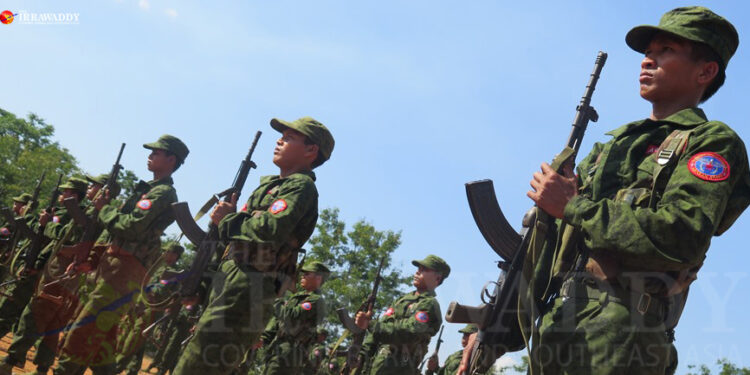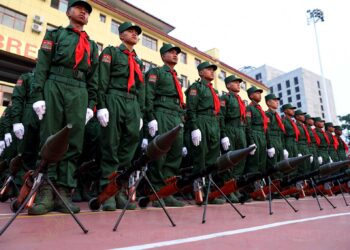Many observers of the conflict in Rakhine have speculated about why the Arakan Army (AA)’s co-members in the Northern Alliance, a grouping of four ethnic armed organizations based near the country’s northern border, do not join it on the battlefield, given the alliance members’ standing agreement to help each other when under attack.
Clashes have occurred almost daily since the Myanmar Army and the AA starting warring against each other in Rakhine State over five months ago. Amid reports of civilian deaths during the fighting, three Northern Alliance members—the AA, Ta’ang National Liberation Army (TNLA) and Myanmar National Democratic Alliance Army (MNDAA)—issued statements on March 19 and April 24 warning that if the Myanmar Army did not stop its military activities in Rakhine, the other members would offer military assistance to the AA.
However, this stand has been made on paper only—there has been no action from the Northern Alliance despite the tough talk.
The Northern Alliance typically issues statements before launching military offensives. In the past, they have acted in accordance with such statements. For example, members came to the aid of the Kachin Independence Army when the Myanmar Army launched a major military offensive in Kachin State in 2018; they also launched attacks in Kokang to reclaim territory seized from the MNDAA by the Army in 2017. AA members were among the Northern Alliance troops fighting the Army at that time.
The questions over why the Northern Alliance members are not helping the AA have given rise to speculation that the Northern Alliance is split over the war in Rakhine.
“We [the Arakanese people] are not worried at all about fighting the Myanmar Army. [The Northern Alliance members] are all unified [on the issue of Rakhine],” AA spokesperson Khaing Thu Kha told The Irrawaddy.
He added that the AA was capable of handling the Tatmadaw on its own.
The ongoing fighting between the Myanmar Army and the AA is testing the internal solidarity of the bloc.
According to some Northern Alliance sources, the main player blocking any attempts by members to begin fighting in support of the AA is China, which wants to see its border with Myanmar stable in order to implement development projects in both countries.
A second actor with an interest in blocking any such plans is the United Wa State Army (UWSA). The Northern Alliance was prepared to attack the Myanmar Army in March after issuing the first statement. However, the UWSA blocked the plan as it was concerned that fighting would disrupt its plans to hold a huge celebration of the 30th anniversary of its ceasefire agreement with the government on April 17. The celebration went ahead as planned.
So, given this situation, who among the Northern Alliance members would dare to tell China they want to attack the Myanmar Army on the border to help the AA? It seems likely the AA already understands that it will have to fight this war alone, without battlefield assistance from its alliance partners.
You May Also Like These Stories:
Fresh Clashes Break Out in N. Rakhine
20 Civilians Killed in Clashes Between Army, AA Since January, Gov’t Says
At Least 20 Troops Killed in Paletwa Clashes, AA Says

















